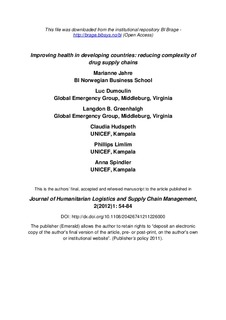Improving health in developing countries: reducing complexity of drug supply chains
Jahre, Marianne; Dumoulin, Luc; Greenhalgh, Langdon B.; Hudspeth, Claudia; Limlim, Phillips; Spindler, Anna
Journal article, Peer reviewed
Permanent lenke
http://hdl.handle.net/11250/93502Utgivelsesdato
2012Metadata
Vis full innførselSamlinger
- Scientific articles [2181]
Originalversjon
10.1108/20426741211226000Sammendrag
Purpose of this paper
Uganda is one of many African countries struggling to develop adequate healthcare, particularly in regard to local treatment and access to drugs. The purpose of this paper is to contribute to the understanding of how reducing supply-chain complexity can improve health in developing countries.
Design/methodology/approach
This study and evaluation included 50 interviews and 27 site visits of the public healthcare system in Karamoja, northeast Uganda. A mapping of drug-supply chains was undertaken to identify causes of stock shortages and possible solutions. A model for logistics process redesign was used for the analysis. Results were quantified with use of a simple tool developed for this specific purpose.
Findings
The main conclusion is that less supply-chain complexity can produce higher customer service in terms of less stock shortages, while keeping costs down. By reducing lead times and uncertainty, increasing order frequencies, and moving order points and safety stocks, there may be better integration between information and goods flows and bottlenecks in the supply chain may be reduced.
Research limitations/implications
While the empirical study is extensive, there are uncertainties in the data that must be taken into account. The effects of the suggested solutions remain to be analyzed and documented upon implementation. Practical implications
The study was rooted in a practical problem and provides practical solutions for developing countries and agencies providing aid.
Social implications
Stock shortages of life-saving drugs are a general problem in countries with lack of financial and technical infrastructure. Improvements will impact the lives of many people.
Value of the paper
The paper provides an understanding of the applicability of traditional logistics principles in a new context. It provides the academic community with a much-needed in-depth understanding of humanitarian logistics. The approach can be used in other studies
Beskrivelse
This is the authors’ final, accepted and refereed manuscript to the article
